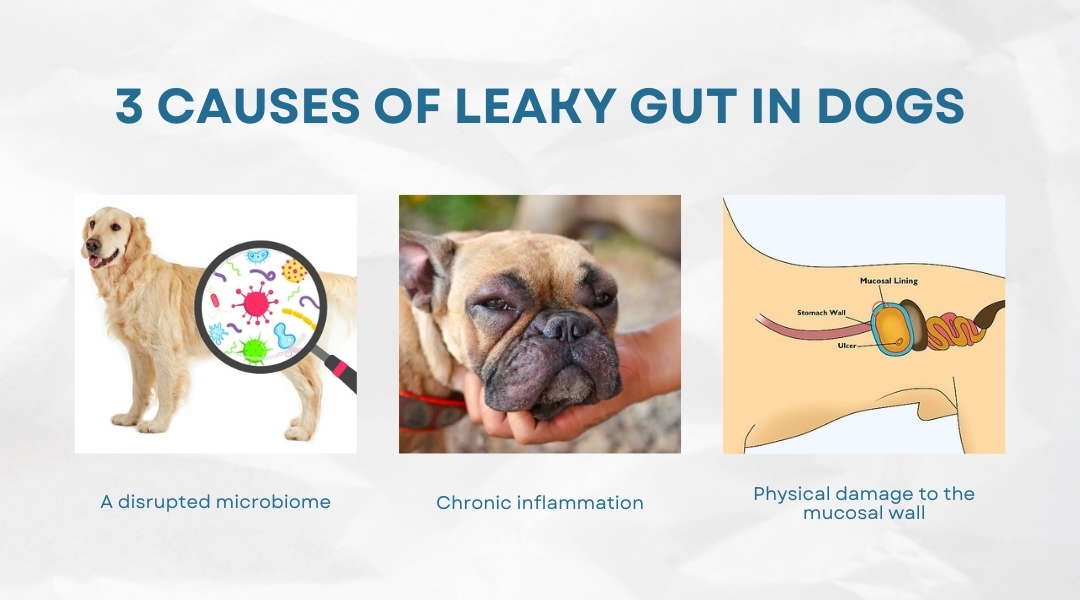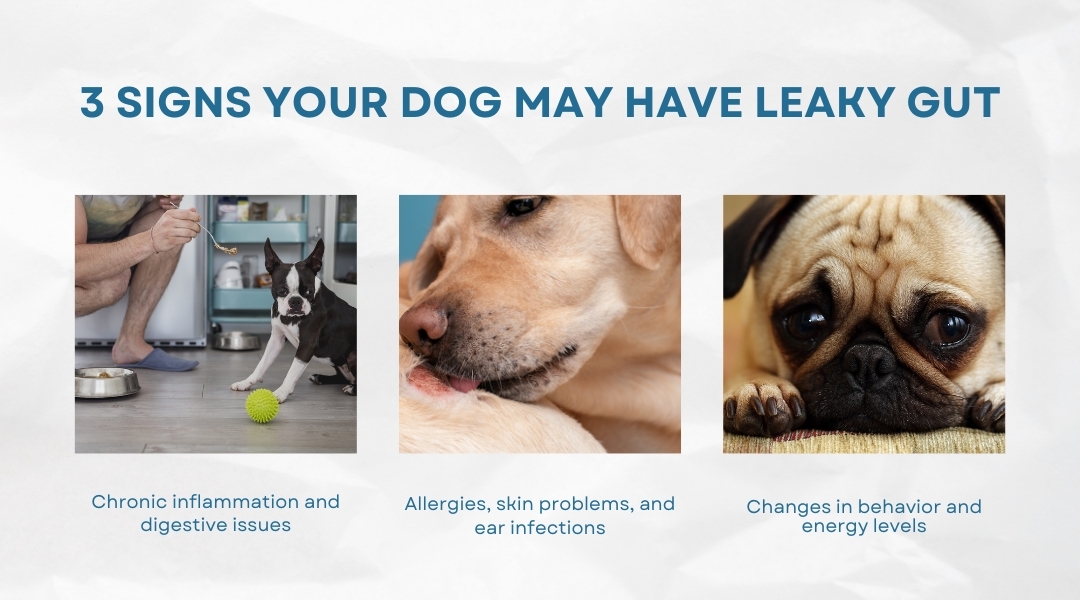Leaky Gut Syndrome in Dogs
Posted by Volhard Dog Nutrition on Jun 2nd 2025
Has your dog been scratching nonstop, turning their nose up at the foods that they used to love, or dealing with constant stomach upset? Maybe you’ve changed their diet, switched to a soothing shampoo, or even visited your vet, yet the issue doesn’t cease to exist.
If that sounds familiar, there’s a chance your dog is dealing with something deeper than just allergies or picky eating:
Leaky Gut Syndrome!
With the right support and a more holistic look at your dog’s health, you can start healing their gut and help them feel like themselves again!
What you will learn:
- What leaky gut syndrome is in dogs, including how a compromised intestinal lining can lead to widespread health issues like digestive problems, skin conditions, and behavioral changes.
- The leading causes and triggers of leaky gut in dogs, such as poor diet, medications (like antibiotics and NSAIDs), environmental toxins, and chronic stress.
- How to recognize common signs and symptoms of leaky gut in your dog, and the holistic approaches that can support gut healing and overall well-being.
What is Leaky Gut Syndrome in Dogs?
Leaky Gut Syndrome (LGS) occurs when the intestinal lining becomes compromised, allowing harmful chemicals to escape into the bloodstream.
Normally, the gut wall is tightly sealed with cells that regulate what passes through, absorbing nutrients while keeping out toxins, undigested food particles, and pathogens. When that barrier is damaged, it becomes porous or “leaky,” leading to a cascade of health problems.
Once foreign particles enter the bloodstream, the immune system treats them as invaders, often triggering widespread inflammation, food sensitivities, or skin conditions.

What Causes Leaky Gut in Dogs?
The gut lining can be damaged by several internal and external factors. These include a disrupted microbiome, chronic inflammation, or physical damage to the mucosal wall.
When the mucous membrane of the intestinal tract becomes thin or cracked, it can no longer maintain its protective function. This breakdown often begins subtly, but over time, it paves the way for larger issues like food intolerances, yeast overgrowth, and chronic gastrointestinal distress.
Common Triggers: Toxins, Diet, and Medications
Dogs are constantly exposed to stressors that can compromise gut integrity. Processed foods, preservatives, and artificial additives can irritate the digestive tract, especially in sensitive dogs.
Environmental toxins—from pesticides on grass to household cleaners—also play a role. Medications like NSAIDs and steroids, while helpful in the short term, can irritate the gut lining and disrupt the balance of beneficial gut bacteria.
The Role of Antibiotics and Over-Vaccination
Antibiotics are designed to eliminate harmful bacteria, but they often take beneficial gut microbes down with them. This disruption to the microbiome weakens the intestinal barrier and can leave the gut vulnerable to inflammation and infection.
Over-vaccination may also contribute by overstimulating the immune system, potentially leading to an overactive immune response in the gut. This can erode the gut lining over time and open the door to systemic inflammation and immune dysregulation.
Environmental and Lifestyle Stressors
Chronic stress—whether from noise, separation anxiety, or a lack of exercise—affects more than just behavior. It can influence hormone levels and gut motility, both of which are linked to digestive health.
Poor-quality water, exposure to pollutants, or even frequent relocation can disrupt your dog’s gut balance.

3 Signs Your Dog May Have Leaky Gut
Chronic Inflammation and Digestive Issues
Dogs may experience bloating, gassiness, loose stools, constipation, or intermittent vomiting. The gut struggles to process and absorb nutrients efficiently, which can also lead to weight loss or a dull, brittle coat. This low-grade inflammation spreads beyond the gut and affects overall health and comfort.
Allergies, Skin Problems, and Ear Infections
Dogs may develop persistent itching, hot spots, rashes, or dry, flaky skin. Chronic ear infections, especially when recurring or affecting both ears, are another red flag. These issues are often mistaken for environmental allergies, but they may actually be rooted in gut dysfunction.
Changes in Behavior and Energy Levels
Because the gut and brain are deeply connected, leaky gut can also affect your dog’s mood and behavior.
You may notice signs of anxiety, irritability, or even depression. Some dogs become withdrawn or less interested in play, while others display hyperactivity or restlessness. Low energy, fatigue, and poor recovery after exercise are also common.

Volhard’s Digestive Enzymes: A Smart Gut Health Solution
For dogs dealing with digestive upset, food sensitivities, or poor nutrient absorption, Volhard’s Digestive Enzymes offer targeted, daily support that works harmoniously with the gut. These enzymes play a key role in helping your dog’s body break down and utilize nutrients.
What sets Volhard’s formula apart is our comprehensive blend of digestive enzymes, prebiotics, and probiotics, tailored to support both digestive and immune function.
Key ingredients like pancreatin aid the pancreas, while probiotics such as Lactobacillus acidophilus, Bifidobacterium bifidum, and Enterococcus faecium restore healthy gut flora. These strains, along with enzymes like amylase, lipase, and cellulase, not only improve digestion but also reduce symptoms like bloating, diarrhea, and even urinary tract issues.
With a minimum of 20 billion CFU per gram, Volhard’s formula delivers powerful gut-balancing support in a single scoop. While Digestive Enzymes offer additional prebiotics and probiotics to your pet's bowl, the best solution for your dog may be a diet already equipped with the perfect blend of enzymes, such as NDF2 or Rescue!

Supporting Healing With the Leaky Gut Protocol
When it comes to repairing a damaged gut, a band-aid solution won’t do. The Adored Beast Leaky Gut Protocol takes a layered, holistic approach, targeting the root causes of gut dysfunction.
The protocol begins with Rebalancer, a homeopathic blend that helps detox the adverse effects of over-vaccination. From there, the regimen moves into a multi-step process:
- Liver Tonic: supports the body’s natural detox pathways.
- Healthy Gut: delivers a powerful combination of digestive enzymes and probiotics to balance the microbiome and ease digestion.
- Gut Soothe: targets inflammation and helps repair the intestinal lining with ingredients like slippery elm, licorice, and L-glutamine.
- Gut Seal: works to tighten up the damaged cell junctions in the gut wall, preventing further leakage of harmful substances.
This step-by-step process is typically used once per year or after a bout of yeast overgrowth, in which case, the Yeasty Beast Protocol should be used first.

Volhard Dog Nutrition Helps Your Dog Thrive With a Healthier Gut!
For dogs recovering from leaky gut or simply needing stronger digestive support, Volhard’s Digestive Enzymes are a smart addition to their daily routine.
For more advice on dog nutrition, health, and training, contact us and check out our other blogs, too!
Volhard Dog Nutrition and its expert canine nutrition coaches offer online consultations to help more dog parents discover why and how to feed their dogs the healthiest foods!
Speaking to a Volhard canine nutrition coach will help you understand the inseparable relationship between healthy food, a healthy body, and a healthy mind.
If you want to contact one of our Volhard canine nutrition coaches, you can do so by utilizing our Live Chat feature or scheduling a consultation. don't hesitate to access our consultation page!
References
- Kiełbik, Paula, and Olga Witkowska-Piłaszewicz. "The Relationship between Canine Behavioral Disorders and Gut Microbiome and Future Therapeutic Perspectives." Animals : An Open Access Journal from MDPI, U.S. National Library of Medicine, 12 July 2024, pmc.ncbi.nlm.nih.gov/articles/PMC11273744/. Accessed 10 May 2025.
- Kinashi, Yusuke, and Koji Hase. "Partners in leaky gut syndrome: Intestinal dysbiosis and autoimmunity." Frontiers in Immunology, vol. 12, 22 Apr. 2021, https://doi.org/10.3389/fimmu.2021.673708. Accessed 10 May 2025.
- Suchodolski, Jan S. "Diagnosis and interpretation of intestinal dysbiosis in dogs and cats." The Veterinary Journal, vol. 215, Sept. 2016, pp. 30–37, https://doi.org/10.1016/j.tvjl.2016.04.011. Accessed 10 May 2025.

